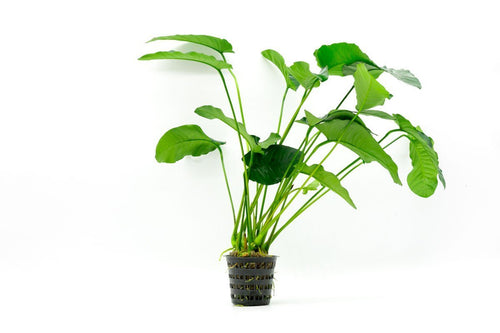

Anubias Barteri Mother Pot
- $ 23.99
- $ 23.99
Common Name: Anubias Barteri
Mother Pots consist of multiple, mature plant species. Each pot may include 2-4+ individual plants. Final number of individual plants may vary depending on genus and species.Mother pots are very large, mature plants in the noted family. These plants have been around for much longer and are responsible for the propagation of the smaller sized pots that are commonly seen in the aquarium hobby. Their large size makes them the perfect choice for larger planted tanks!
Anubias Barteri is a popular aquatic plant, frequently used in all types of aquariums. Like other Anubias it can grow in both aquariums and terrariums either submerged or emersed. It has slightly longer stems compared to Anubias Nana but the shape and characteristics are similar. This plant is suitable as a midground and background as the leaves can grow up to 3” long.
Like other Anubias, this variant is a flowering plant that grows best when the rhizome is attached to a hard surface such as wood or stones. They have low to medium light requirements and can benefit from regular fertilization. CO2 is not necessary but can promote faster growth and more robust leaves. Since its a slow grower, the leaves are susceptible to algae growth if placed under high lighting.
Notes:
- Anubias are strong plants that can thrive in a variety of environments.
- These epiphytes can be planted above the substrate or attached to hardscape .
- Burying the rhizome, will cause the plant to melt and die.
- Do not make drastic changes to the aquarium. Unstable parameters will result in melt and rotting of the aquarium plant.
- Please be sure to remove this plant from its pot. For instructions on how to properly prep aquarium plants, click here .
- CO2 injection and quality aquarium soil will yield better growth.
- Please research appropriately to ensure your plant thrives.
Family Name: Araceae
Origin: West Africa
Height: 6-10"
pH: 6-7.5
Care: Easy
Light: Low
Co2: Not necessary
Propagation: Separate by Rhizome
Growth rate: Slow to moderate
-
Tweet -
Pin it